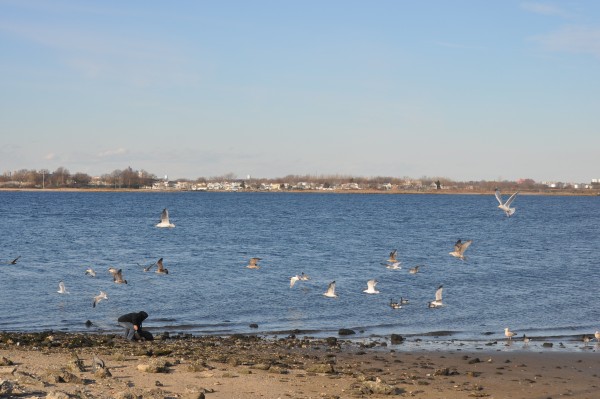In response to a recent upswing in the harvesting of shellfish and baitfish in the waters of the Jamaica Bay Wildlife Refuge, the U.S. Park Police reported that during a recent surveillance operation they arrested 14 people for illegal fishing and interfering with official agency operations.
In addition, 41 summonses were issued for various resource violations, such as catching prohibited fish.
The agency said that the harvest of small baitfish, left unchecked, could impact both migratory birds and other marine life that depend on them as a source of food.
As part of the Gateway National Recreation Area, the Jamaica Bay Wildlife Refuge includes more than 13,000 acres of water.
The USPP says that illegal fishing in the bay has been a problem for years, particularly with clamming, which has been prohibited since before the establishment of Gateway National Recreation Area in 1974; but officials say the problem has been getting worse and more widespread in the last couple of years.
“A big problem as far as illegal fishing is the harvesting of small fish by the buckets,” said Daphne Yun, a spokesperson for the National Park Service. “People are using seines (dragnets) to catch small baitfish, but are also catching some regulated fish in the process. These regulated fish then never have a chance to spawn. The over-harvesting of baitfish also has an impact on migratory birds that rely on these small fish for their long flights.”
Area environmental groups have also noted the increase in illicit activity in the bay.
“The Jamaica Bay Ecowatchers have been receiving numerous reports of illegal poaching of shellfish and baitfish in Jamaica Bay for quite some time and are relieved to see the current enforcement action undertaken by the National Park Police,” said Dan Mundy, vice president of the group.
Mundy, along with USPP officials, also noted that illegal fishing, in addition to upsetting the ecological balance in the bay, can cause illness to people who may unknowingly consume fish from the basin.
“The poaching activities in the park are a threat to public safety in the case of the shellfish and a threat to the marine habitat of the bay in the case of the baitfish,” Mundy said.
Dan Hendrick, who has penned a history on the bay and is producing a documentary called “Saving Jamaica Bay,” agreed with Mundy and park officials on the dangers of eating illegally caught fish.
“Shell fishing has been banned in Jamaica Bay since the 1920s because of sewage contamination that caused dozens of cases of typhoid,” Hendrick said. “Although the bay is cleaner now than it has been in generations, sewage overflows still happen. The health threat is still very real.”
Mundy added that shellfish poachers can often be seen harvesting in the low-tide areas of the bay, including adjacent to the Joseph P. Addabbo Memorial Bridge on the Broad Channel side.
The state Department of Health warns to either limit consumption or not eat at all certain types of fish from state waterways, including Jamaica Bay. The state cautions that fish such as bluefish, striped bass, weakfish, American eel, crab and lobster could be contaminated with chemical compounds including polychlorinated biphenyls or PCBs, dioxin, and cadmium.
“We want to make sure that we maintain the waters of Jamaica Bay for future generations by preventing overfishing,” said Gateway Superintendant Jen Nersesian. “We also want to make sure people are not eating these shellfish, since they are not safe for human consumption. We applaud the efforts of this surveillance in helping support the mission of Gateway and the National Park Service.”
By Alan Krawitz

